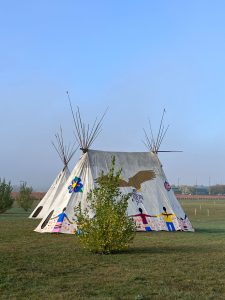Author: Jessica Saler
In Canada, my home country, September 30th is recognized as the National Day for Truth & Reconciliation. The day acknowledges the horrific history of colonization and the residential schools created to assimilate and eradicate Indigenous Peoples across the country. The day honours the children who never returned home and those who survived with scars that can’t be seen with the naked eye. These tragedies occurred not that long ago – if you are Indigenous, that means that either your parents, grandparents, or great-grandparents were directly affected by the residential schools. Personally, I have both settler and Indigenous descent in my ancestry (like many do), which means I have a history from those who caused tragedy and those who suffered because of it.
It only seems fitting that this week’s blog post focuses on the Truth & Reconciliation Commission’s (TRC) Calls to Action report and how it proposes actionable policies and steps towards decolonization and allowing Canada to rethink the meaning of education (and therefore, the Development of future generations).
TRC Calls to Action Report
The Government of Canada officially formed the Truth and Reconciliation Commission (TRC) in 2008 (although it existed for many years prior) to analyse and investigate the effects of the residential schools and then propose potential solutions to undoing the harm caused. After years of research, the TRC released their final report in 2015 with 94 Calls to Action – feasible, actionable steps that can be implemented across the country. The need for new perspectives on development is discussed in Challenging Global Development – Towards Decoloniality & Justice (Biekart et al., 2024), where they say, “studying development today often translates into studying crises caused by development processes themselves” (p.8). The TRC’s report does exactly that, bringing to light the reality of Canada’s history and new perspectives to how we move forward together, by uprooting and changing the systems currently in place. We understand that colonization is an attempt at Western development, but the more we study what development really means, the more we know that sometimes more harm is done than good.
The creation of the report is also a perfect example of communicating for development. In terms of communicating in a way that pushes for justice and decolonization, we can look at some of the Calls to Action that propose redefining our education system to be more inclusive, which we can see below:
Calls to Action 7-12
These actions discuss the Canadian education system and curriculums. It calls on the government to support Indigenous education, acknowledging that Western education doesn’t always mean a well-rounded or proper education. Indigenous education includes learning about the land and cultural practice of their people, and they often educate through stories, using nature as their classroom. We also must not forget that for decades, history classes taught in early and middle years didn’t include the history of Indigenous Peoples, and especially not an accurate account of how the settlers created the country we know now. There is a push to change the narrative of the history taught and to fill in the gaps of historical information that was intentionally left out.
These Calls to Action also suggest incorporating new ways of educating. This includes prioritizing Indigenous languages to be included as language courses in the school system (typically only English and French, the official languages of Canada, are offered), enabling parents to fully participate in their child’s education, and to equally fund those being educated on-reserves versus off-reserves.
Calls to Action 62-63
These two Calls to Action emphasize the importance of building relationships between Indigenous and non-Indigenous people through proper rhetoric and education. This would be done through creating a more intercultural education system at early and middle years education, as well as at post-secondary institutions.
Changing the Narrative
So does changing the education system really change how we define development? The short answer is yes. If we change the rhetoric to include Indigenous perspectives, fill in the parts of history that were left out of the curriculum for decades, and include more Indigenous language and practices in the school system, we would find a more intercultural and inclusive system. This would foster stronger, healthier relationships between Indigenous and non-Indigenous communities and ensure the opportunity for a stronger future and a stronger country,
Historically development referred to how much land or power one held, but by working towards decoloniality we see that we must undo former concepts of development in order to truly grow into a stronger country that eradicates poverty, addiction, and crime instead of trying to eradicate those who were here first.
The Question Remains: Will It Work?
Despite the TRC report being released in 2015, only 13 of the 94 Calls to Action have been completed. 76 of those Calls to Action are steps that fall on the Federal Government directly, either alone or in tandem with the provinces. The question remains whether we will continue to see progression – after all, Canada only saw it’s first Premier of First Nations descent elected last year. With 13 provinces and territories, it seems to still hold an uneven balance of power as settlers still hold majority voting power.
However, there is still hope – after all, we finally are seeing Indigenous representation at a higher political level than ever before, and although Wab Kinew governs one province, he is an Indigenous voice for the entire country. But the work of listening and learning falls on all of us here. We must work together to change the rhetoric, encouraging new ways to learn and to ensure that there are no pieces left out when we teach the future generations our history and how we got here.
References:
Camfield, L., Kathari, U., & Melber, H. (2024). Challenging global development. (K. Biekart, Ed.).EADI Global Development Series. https://doi.org/10.1007/978-3-031-30308-1
Truth and Reconciliation Commission of Canada. (2015). (rep.). Truth and Reconciliation Commission of Canada: Calls to Action. Retrieved from https://ehprnh2mwo3.exactdn.com/wp-content/uploads/2021/01/Calls_to_Action_English2.pdf.



Thanks for sharing this really important point about how education can help with reconciliation and change the way we think about development. It’s frustrating that progress is slow, but there’s definitely hope with more Indigenous voices being heard and included in the conversation.